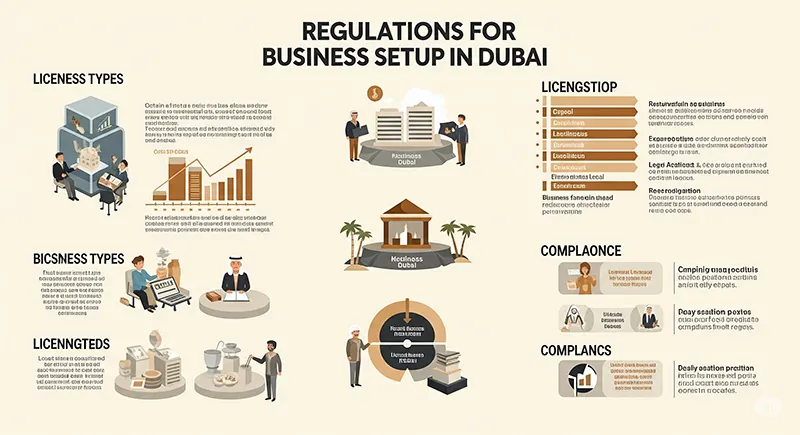Key Takeaways:
- 100% foreign ownership is now permitted for most mainland and all free zone companies, significantly easing prior restrictions.
- Corporate Tax (CT) at 9% on profits over AED 375,000 applies federally, with Free Zones potentially maintaining 0% on “qualifying income.”
- Value Added Tax (VAT) at 5% is a standard indirect tax, requiring registration for businesses exceeding AED 375,000 annual turnover.
- Strict Anti-Money Laundering (AML) and Know Your Customer (KYC) regulations are rigorously enforced, impacting bank account opening and ongoing operations.
- Labor Laws are comprehensive, governing employment contracts, working hours, wages, and end-of-service benefits.
Dubai’s reputation as a global business hub is built not only on its economic dynamism and strategic location but also on its evolving regulatory framework designed to attract and protect investors. For anyone planning a Business setup in Dubai, understanding the regulations is not merely a formality but a critical component of sustainable success. The UAE government continually updates its laws to align with international best practices, enhance transparency, and foster a competitive environment. Staying informed about these regulations, from company ownership to tax obligations and labor laws, is essential for compliant operations.
Evolving Ownership Laws and Corporate Governance for Business setup in Dubai
A pivotal change impacting Business setup in Dubai in recent years has been the significant liberalization of ownership laws. This has fundamentally reshaped how foreign investors can establish their presence.
- 100% Foreign Ownership: The most impactful regulatory update is the amendment to the UAE Commercial Companies Law, effective from June 2021. This change removed the mandatory requirement for a 51% Emirati shareholding for most business activities on the mainland. Foreign investors can now enjoy 100% foreign ownership in a wide array of commercial and industrial sectors, making mainland companies as attractive as free zone entities in terms of control. A list of activities where this 100% foreign ownership is not permitted (considered “strategic impact” sectors) is still maintained. Free zones have always offered 100% foreign ownership.
- Legal Structures: The regulations define various legal structures for businesses, including Limited Liability Companies (LLCs), Sole Proprietorships, Civil Companies, and branches of foreign companies. Each structure has specific requirements regarding share capital, liability, and governance. Most common for Business setup in Dubai is the LLC, now often with 100% foreign ownership.
- Ultimate Beneficial Owner (UBO) Regulations: In line with global efforts to combat money laundering and terrorist financing, the UAE has implemented stringent UBO regulations. Companies must identify and register their ultimate beneficial owners (individuals who directly or indirectly own or control 25% or more of the company’s shares or voting rights, or exercise control through other means). This information must be submitted to the relevant licensing authorities and updated regularly.
- Corporate Governance: Regulations emphasize good corporate governance, especially for larger entities. This includes rules regarding board meetings, shareholder resolutions, financial reporting, and auditing requirements, ensuring transparency and accountability.
These updated ownership laws provide greater autonomy and flexibility for foreign investors making a Business setup in Dubai.
Tax and Financial Regulations for Business setup in Dubai
The financial regulatory landscape for Business setup in Dubai has seen significant changes, particularly with the introduction of new federal taxes, while still maintaining a generally low-tax environment.
- Corporate Tax (CT): A federal Corporate Tax Law became effective for financial years starting on or after June 1, 2023. The standard Corporate Tax rate is 9% on taxable profits exceeding AED 375,000. Profits below this threshold are subject to a 0% rate.
- Free Zone Companies: Free zone companies are also subject to the Corporate Tax Law but can benefit from a 0% Corporate Tax rate on “qualifying income” if they meet specific conditions, such as maintaining adequate economic substance and deriving income from qualifying activities (often international or inter-free zone). All free zone entities, however, must register for Corporate Tax and file annual returns.
- Value Added Tax (VAT): Introduced in 2018, VAT is levied at a standard rate of 5% on most goods and services. Businesses whose taxable supplies and imports exceed AED 375,000 annually are required to register for VAT with the Federal Tax Authority (FTA), maintain proper tax records, and file periodic VAT returns. Certain supplies are zero-rated (e.g., exports, international transport, some education and healthcare) or exempt (e.g., certain financial services, residential property).
- Anti-Money Laundering (AML) and Counter-Terrorism Financing (CTF) Regulations: The UAE has significantly strengthened its AML/CTF framework to align with international standards set by the Financial Action Task Force (FATF). These regulations mandate businesses to:
- Conduct Know Your Customer (KYC) due diligence on clients.
- Implement internal controls and risk assessments.
- Appoint an AML Compliance Officer.
- Report suspicious transactions (STRs) and activities (SARs) to the Financial Intelligence Unit (FIU) via the goAML platform.
- Maintain records for a specified period (typically 5 years). These regulations apply broadly, including to Designated Non-Financial Businesses and Professions (DNFBPs) like real estate agents, precious metal dealers, and company service providers, making compliance a critical aspect of financial operations for Business setup in Dubai.
Labor and Immigration Regulations for Business setup in Dubai
Operating a Business setup in Dubai involves adherence to a robust set of labor and immigration laws that govern employment relationships and foreign talent acquisition.
- Labor Law (Federal Decree-Law No. 33 of 2021): The UAE Labor Law is the primary legislation governing employer-employee relations in the private sector. Key aspects include:
- Employment Contracts: Mandatory written employment contracts, typically for a fixed term, specifying job roles, wages, working hours, and benefits.
- Working Hours and Overtime: Standard working hours (8 hours/day, 48 hours/week), with clear regulations on overtime pay.
- Wages and End-of-Service Benefits: Regulations on minimum wage (though not universally applied, often implied by visa categories), timely salary payments via the Wage Protection System (WPS), and end-of-service gratuity calculation for eligible employees.
- Leave Entitlements: Statutory provisions for annual leave, sick leave, maternity/paternity leave, and public holidays.
- Termination: Specific rules for termination, including notice periods and conditions for summary dismissal.
- Immigration Laws: For foreign investors and employees, obtaining the appropriate residency visas and work permits is crucial.
- Investor/Partner Visas: Available for shareholders of UAE companies, allowing them to reside in the UAE and manage their business.
- Employee Work Permits & Residency Visas: Businesses must sponsor their employees for work permits and residency visas, which involves approvals from the Ministry of Human Resources and Emiratisation (MOHRE) and the General Directorate of Residency and Foreigners Affairs (GDRFA).
- Quotas: Labor quotas may apply based on the company’s size, sector, and nationalization targets (Emiratisation).
- Health Insurance: Mandatory for all residents in Dubai, with employers typically responsible for providing health insurance to their employees.
Compliance with these regulations is essential to avoid penalties and ensure a smooth operational environment for your Business setup in Dubai.
Industry-Specific Regulations and Licensing for Business setup in Dubai
Beyond the general commercial, tax, and labor laws, many sectors in Dubai are subject to specific regulations and require additional approvals or licenses for Business setup in Dubai.
- Regulatory Authorities: Depending on your business activity, you may need approvals from various government and semi-government entities. Examples include:
- Dubai Health Authority (DHA): For healthcare facilities, clinics, pharmacies, and medical professionals.
- Knowledge and Human Development Authority (KHDA): For educational institutions and training centers.
- Real Estate Regulatory Agency (RERA): For real estate brokers, developers, and property management companies.
- Dubai Municipality: For food establishments, environmental compliance, and construction-related activities.
- Telecommunications and Digital Government Regulatory Authority (TDRA): For telecommunication services.
- Financial Services Regulators: For financial institutions, specific free zones like DIFC and ADGM have their own independent financial services regulators (DFSA and FSRA, respectively).
- Data Protection and Privacy: While a comprehensive federal data protection law is still developing in some areas, the UAE has implemented regulations, including the Federal Data Protection Law (Federal Decree Law No. 45 of 2021) which largely mirrors GDPR principles, requiring businesses to protect personal data.
- Intellectual Property (IP) Laws: The UAE has robust laws protecting intellectual property, including trademarks, copyrights, and patents. Businesses are encouraged to register their IP to safeguard their brands and innovations.
- Consumer Protection: Regulations are in place to protect consumer rights, ensuring fair trading practices and product safety.
Adhering to these industry-specific regulations and obtaining all necessary permits is crucial for the legal operation of your Business setup in Dubai.
How Can Meydan Free Zone Help?
For entities looking to understand and comply with What regulations for business setup in Dubai?, Meydan Free Zone in Dubai plays a significant role in simplifying the regulatory journey. As a leading free zone, Meydan Free Zone in Dubai operates under its own well-defined legal framework, which is fully compliant with federal UAE laws.Meydan Free Zone in Dubai guides businesses through compliance with Corporate Tax, VAT, and particularly stringent AML/KYC requirements. They provide access to templates for UBO declarations and offer clear information on economic substance regulations (ESR) that free zone companies must adhere to. Their streamlined processes for trade license issuance, visa processing, and ongoing regulatory support ensure that companies operating within Meydan Free Zone in Dubai remain compliant with both free zone and federal mandates, greatly reducing the administrative burden and allowing businesses to focus on their core operations.










